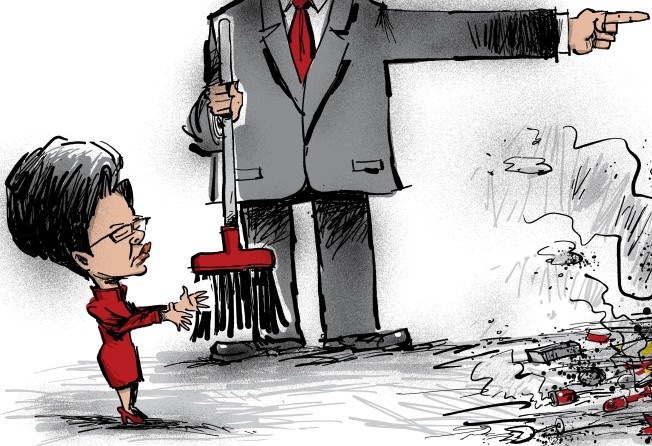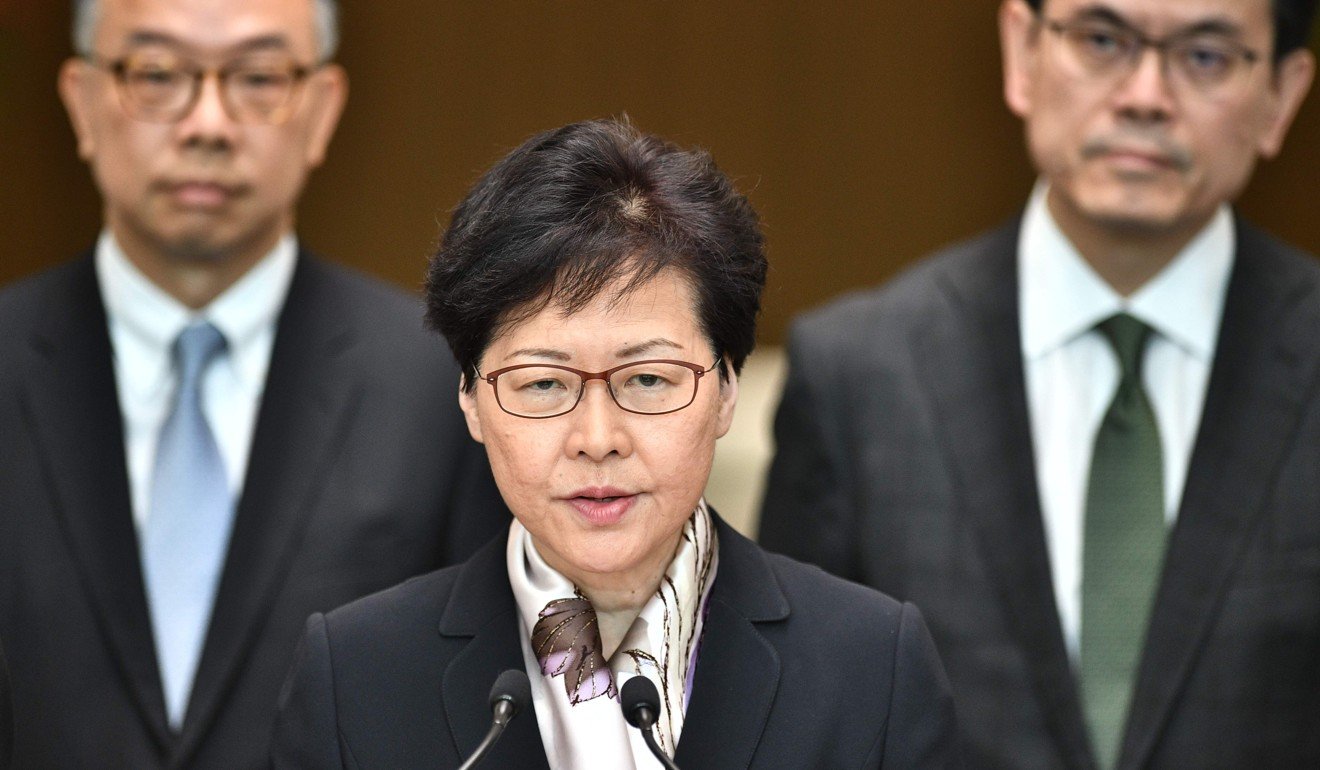Beijing won’t grant Hong Kong real democracy, but it must at least hold Carrie Lam accountable for the political chaos
- It is hard for the authorities to meet anti-extradition protesters’ demand for democracy, but there must be a public accounting of the saga. Hong Kong faces its biggest crisis in 22 years, but no official has assumed responsibility

With summer coming to a close, the protest movement of nine weeks is nearing an inflection point. Incidents of violence against protesters and the unprecedented participation of civil servants in protests that have paralysed the city present a challenge to Beijing.
Armed suppression risks destroying the appeal of a global business centre, but failure to resolve the crisis could encourage protesters in Hong Kong and elsewhere in China.
The mass protests have brought into sharp focus the fundamental flaw in Hong Kong’s relationship with China. Beijing exercises sovereignty, but the people of Hong Kong expect to choose their government.
The huge anti-government protests began with a single demand: withdraw the extradition bill, which if passed would have made it legal for Hong Kong people to be sent to the mainland for trial. The government suspended the bill, but refuses to withdraw it despite widespread demands.
As a result, other demands have emerged, including one not within the power of the Hong Kong administration to grant – for democracy. This was so five years ago during the Occupy movement, and it remains the case today.
On July 29, when the Hong Kong and Macau Affairs Office, a cabinet-level agency under China’s State Council, held a press conference, a reporter asked if there would be electoral changes to alleviate the current pressure.
The answer, in brief, was no: “The electoral method in Hong Kong is stipulated by the Basic Law … and the relevant supporting laws,” responded spokeswoman Xu Luying. “We must follow the law, now and in the future.”
Chief Executive Carrie Lam Cheng Yuet-ngor clearly understands the hunger for democracy. At a press conference on July 9, she linked the current movement to the Occupy campaign of 2014, suggesting she believed that the protests reflect problems that have gone unaddressed.
“But this time,” she said, “I don’t think we could continue to ignore those fundamental and deep-seated problems in Hong Kong society.”
Since the primary issue behind Occupy was election of the chief executive by universal suffrage without pre-selected candidates, a reporter asked if the government planned to “restart political reform”. Lam immediately backed off, saying the deep-seated problems could be economic or political and first must be identified.
Britain, in its 150 years as colonial master, did not allow democracy in Hong Kong. Until 1984, when London agreed to hand the colony to Beijing in 1997, the city’s legislature was appointed, and top government officials were British. But the colonial system did allow personal freedoms that were treasured.
Hong Kong people were assured that, under the creative formula of “one country, two systems”, they would govern themselves and that existing legal, economic and social systems would remain unchanged for 50 years.
From the Hong Kong perspective, China hasn’t lived up to its promises. Since 1997, China has hand-picked Hong Kong’s executives. As a result, they are perceived as Beijing’s man or woman in the city rather than leaders whose job is to defend Hong Kong and the interests of its people.
To Beijing, Hong Kong people – with so many more rights than the 1.4 billion people on the mainland – appear ungrateful.

Inevitably, the protests, many of which end in pitched battles with the police, have had economic repercussions. Negative publicity has resulted in countries including Japan and South Korea issuing travel advisories. Financial Secretary Paul Chan Mo-po’s weekly blog reports that the unrest has harmed local retail and catering businesses.
The business community has responded by calling for action. The Hong Kong General Chamber of Commerce issued a statement on July 22 calling on the government to withdraw, not merely suspend, the extradition bill.
It also called on key officials to resign and urged immediate establishment of an independent commission of inquiry to “examine the facts surrounding the events that are at the root of the tensions and their escalation to the current situation”.
The Hong Kong and Macau Affairs Office has reiterated China’s support for Lam. Beijing clearly hopes Lam, with police support, will restore order.
On July 30, Lam hosted a rare lunch for more than 40 representatives of international and local chambers of commerce. The meeting, according to a press release, was “to exchange views on Hong Kong’s challenges and opportunities” and aimed at “formulating policy measures in the upcoming Policy Address”. The address is delivered annually in October.
Reports emerged that the Independent Commission Against Corruption is investigating the police role in the mob attack at Yuen Long station. Meanwhile, police tactics have hardened. On July 31, police charged 43 protesters with rioting, punishable by 10 years in prison.
With summer’s end and schools reopening, the protest movement may lose one of its major constituencies: students. Of the 43 charged with rioting, 14 were students, the youngest a 16-year-old girl. But the movement’s intensity shows no signs of weakening. Moreover, there can be no return to normalcy without a public accounting of the extradition saga.
China will not allow the kind of democracy that other countries take for granted. Beijing fears that if it grants Hong Kong genuine democracy, provinces across the mainland will make similar demands, rendering the country uncontrollable by the Communist Party.
In lieu of democracy, there is a need for accountability. Hong Kong’s first chief executive, Tung Chee-hwa, created politically appointed ministers who would assume responsibility.
The system isn’t working. Hong Kong faces its biggest crisis in 22 years, but no official has assumed responsibility. Beijing is shielding the top person responsible, the chief executive. For proper governance in Hong Kong, Beijing must support a genuine system of accountability – which is possible with “one country, two systems”.
Frank Ching is a journalist and author of Ancestors: 900 Years in the Life of a Chinese Family. Follow him on Twitter. Reprinted with permission from YaleGlobal Online